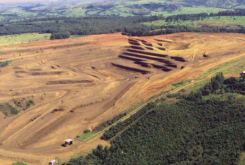In recent weeks, the government of Mozambique has been involved in intense negotiations with seven countries to secure funding for one of its largest natural gas projects and overcome scepticism about whether it will honour its debt commitments. The LNG plant and field development combined, in the Rovuma Basin, involves an estimated investment of US$25 billion.
The talks involve seven Export Credit Agencies (ECAs), including Japan (JBIC), China (China ExIm), South Korea, USA (US-ExIm), Germany (Atradius) and Italy (Servizi Assicurativi del Commercio Estero – SACE).
In the last two months, Max Tonela, Minister of Mineral Resources and Energy, twice met the ECAs, first in Japan on October 24th, and then in Maputo on December 12th. At the most recent meeting, Minister of Economy and Finance Adriano Maleiane and IMF representative in Mozambique, Ari Aisen, joined Tonela.
At the closed-door meeting in Maputo, the government ministers expressed optimism about the country’s economic prospects and said that the government intended to honour its commitments to international creditors.
The image of Mozambique in the global financial market has been damaged in the last few years by its default on several financial commitments. Maleiane said that payments on the debts contracted by Ematum, MAM and ProIndicus, totalling more than US$2.2 billion, were not made due to a currency crisis that caused a depreciation of the metical. He assured his listeners that the country intended to pay his debts; he cited the recent agreement in principle signed with the creditors of Ematum as proof of the government’s commitment.
According to our sources, Maleiane´s points were received with scepticism. He blamed the government’s default on the exchange rate crisis, when most people believe that the decline in the metical was a consequence of the default.
According to official sources, the government’s acceptance of the agreement to restructure Ematum’s debt is unfavourable to the country. It uses the Value Instrument Recovery (VRI) system, which consists of indexing debt instalments to gas revenues up to the maximum amount of US$500 million. This is necessary to restore confidence in the international markets, in order to allow the financing of the LNG project.
The ECAs are evaluating the possibility of funding the Rovuma Area 1 project, which is operated by Anadarko. The government also wants funding for the
Empresa Nacional de Hidrocarbonetos (ENH, National Hydrocarbons Company), which has a 15% minority stake in the Rovuma Area 1 project. Given the high overall investment in the project, ENH’s contribution is over USD$2 billion.
Because of the low external credibility of the government, the other partners have imposed as a condition for payment of their respective shareholding that ENH become an investor under conditions similar to those of the other shareholders, and with the guarantee of the state.
At the Maputo meeting, minister Tonela assured his listeners that the Government would issue sovereign guarantees to allow ENH to be financed in the international markets, to cover its share in the project.
Tonela has been assuring potential financial investors that Anadarko´s project will be the first large-scale onshore LNG project. He is moving ahead with the Exxon Mobil and ENI´s (Area 4) offshore project, representing an investment of about US$8 billion at an advanced stage of development. It is the only one with the final investment decision already taken and gas sales agreement already secured.
Investment in Area 1 is especially valuable — Area 4 has a lower investment level and will be offshore.
The Government sees the final investment decision regarding Anadarko´s project as a matter of urgency, so that construction will begin in 2019, a politically decisive year for the president, who faces re-election.
In discussing the risks of the LNG project, the government has ignored the threat posed by armed insurgent attacks in Cabo Delgado. Most international analysts believe that they will not threaten the projects; but the state’s inability to control the attacks affects the country’s image as a safe investment destination and a place for expatriates.
Portuguese oil company Galp Energia has a 10-per-cent stake in the Area 4 concession of the Rovuma basin of northern Mozambique. This is expected to become one of the major natural gas-producing areas of the world in four to five years.
The Area 4 block’s participants are the Mozambique Rovuma Ventures, a partnership between ExxonMobil, ENI and the China National Petroleum Corporation which jointly control 70%; the remaining 30% is divided equally between Portuguese group Galp Energia, South Korea’s Kogas and ENH.



